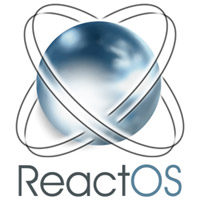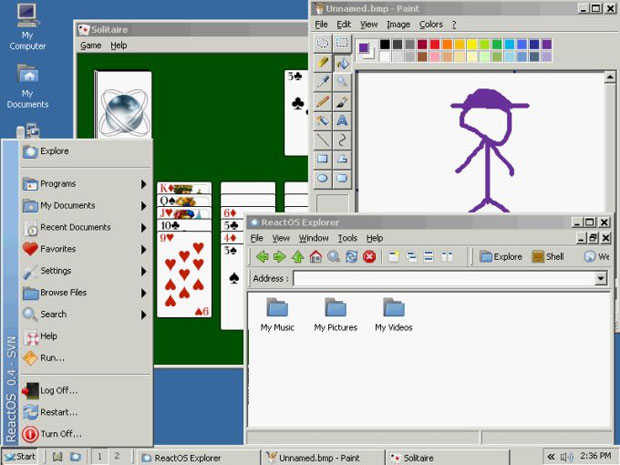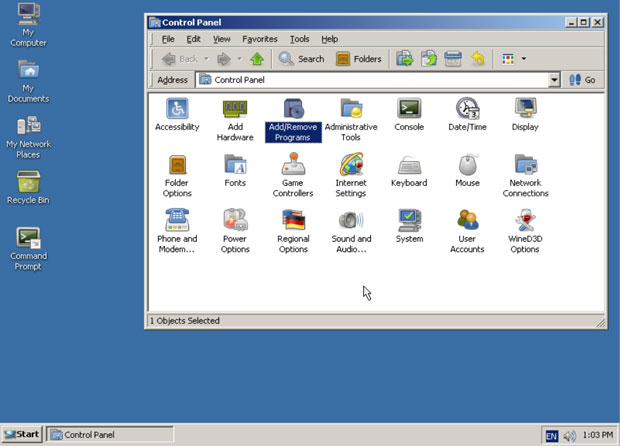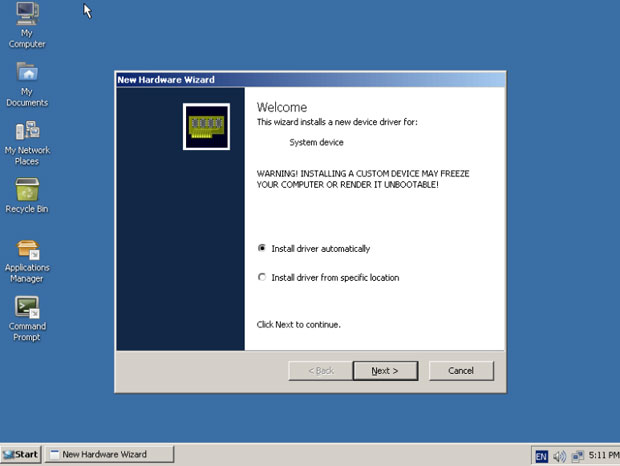
![]()
If you want to run a clone of Microsoft Windows to escape the drama of upgrading to Windows 10, try ReactOS — but do not expect it to be a fully functional replacement any time soon.
ReactOS is a free, open source operating system built on the design principles found in the Windows NT architecture.
Just remember that ReactOS is a Windows clone and not a Linux distro with a Windows-like desktop shell. It does not run Linux apps.
The release last month of version 0.4.1 brings this unique open source project one step closer to its goal of providing users full compatibility with Windows software on a free OS made almost from scratch.

It has taken developers two decades to ramp up for this ReactOS alpha release. This open source operating system is strictly for x86/x64 PCs.
Windows Revisited
ReactOS started out in 1996 as FreeWin95, a Windows 95 clone project. However, the project bogged down and failed to produce continuing releases.
Several project members, lead by James Filby, in 1998 revived it as “ReactOS,” with a focus on implementing features of later Windows versions, primarily WindowsNT. The developers created the basis for a new NT kernel and basic drivers.
The current kernel is not based fully on the original NT kernel. Depending on which development source you check, the kernel merely exposes the same application program interface. It also does not use Wine in its entirety to run Windows applications. Rather, it uses wine userspace libraries. It runs Windows applications natively, along with Windows drivers.
The name “ReactOS” refers to the group’s dissatisfaction with and reaction to Microsoft’s monopolistic position, according to published papers on the project’s development. The ultimate goal of ReactOS is to allow you to remove Windows and install ReactOS without noticing the change.
Funding Fest
The ReactOS project in 2014 announced an Indiegogo campaign to launch ReactOS Community Edition, a version based on the 0.4 release. Its goal was to raise US$50,000.
The community edition would be community-centric. ReactOS funders and users would vote to decide which software and hardware drivers the project would support. The effort fell short, though.
The crowdfunding campaign finished with half of the hoped-for total. The developers regrouped with plans to use the $25,141 for the development of the community edition. The community voting aspects were put into play.
Possible Future?
Whether ReactOS will progress beyond the current 0.4.1 release to become an open source drop-in replacement for Windows is anybody’s guess. It is a huge challenge for the developer team and the ReactOS community to build a clone of Windows, but the alpha release is tremendously encouraging.
ReactOS targets mainly the x86/AMD64 PC platform.
It also has been ported in part to the ARM architectures. Support for the Xbox, a variant IA-32 architecture, has been added through the use of an architecture-specific HAL. Those efforts, along with a port to PowerPC, no longer are actively maintained, however, according to published accounts of the project’s progress.
ReactOS is written primarily in C, with some elements, such as ReactOS File Explorer, written in C++. The project implements Windows API functionality, in part, and has been ported to the ARM and AMD64 processor architectures. As part of the FOSS ecosystem, ReactOS taps into other projects, such as Wine, a Windows compatibility layer for Unix-like operating systems.
Unique Appeal
The concept of developing an open source operating system that mimics a now out-of-date Microsoft Windows platform might be flawed. It might not make much sense to diehard fans of Windows 10.
However, many current Windows users are reluctant to accept the radical user interface changes of Windows 10. Many more dislike Microsoft’s strong-arm tactics in forcing users to upgrade. So an open source clone of a classic Windows OS platform might fill a need for a vast user segment.
As for me, I have several aging computers that don’t meet Windows 10 hardware requirements. With no continuing support for Windows XP in one case and Windows 7 facing obsolescence in another, I can see the usefulness behind ReactOS.
Do not get ahead of yourself with expectations of a free Windows-like OS, however. The current release is strictly an early developmental step. ReactOS is a long way from fully restoring legacy Windows boxes to service using an alternative to Linux.
Unlike Windows, ReactOS is an open source project that uses Wine and other tools to enable support for Windows apps — but hey, version 0.4.1 is a big step forward. It works. It runs a growing list of Windows programs.
Look and Feel
One major advantage to ReactOS is its familiar desktop. Anyone used to older versions of Microsoft Windows will be right at home with ReactOS. It has a classic Windows desktop.You get a traditional Start menu. You have a functioning taskbar and a Windows-like file explorer.

It even comes with Solitaire and Minesweeper preinstalled.
ReactOS has a dedicated application manager to install tested and certified third-party programs from its repository. You also can download apps outside of the application manager.
You will need to install a collection of applications to use in ReactOS. Aside from some basic system tools, not much is provided by default.
In some cases, you have to apply your own resources to find and install Windows programs. Some work out of the box. Others do not.
Software Suppliers
Your best bet in hunting down usable Windows software beyond the limited ReactOS development ecosystem is to check out Windows-based cross platform open source projects. The developers already have done some of that checking for you.
If, like me, you have cartons of CD installation disks for your used-to-be Windows program library, you have lots of software that might be usable once again. Just be prepared for some trial and error. If you stray beyond the published tested software, you will find that some of what you have does not install — or it may install but not run.
The developers’ software test list includes current versions of open source titles in addition to dozens of Windows programs that both install and run successfully on ReactOS.
A few must-have titles for me include the file archiving tools WinRAR and 7-ZIP. The list also shows a handful of Windows titles that installed but failed to execute.
The list of successfully running programs includes office suites and Web browsers. The list also includes many open source giants such as Firefox and LibreOffice, which work great on ReactOS.
A Closer Look
You have three options for investigating ReactOS:
- You can install it directly to an unused legacy hard drive computer. Be sure to download the installable ISO.
- You can run ReactOS in a live session. You will need the live session ISO rather than the installable download.
- You can use either ISO version to run ReactOS in a virtual machine environment.
I tried all three approaches. Each one worked with few or no glitches. Actually installing ReactOS to a physical hard drive requires a very similar process and step-by-step configuration as you would experience installing Windows XP, Windows NT or Windows 2000.

ReactOS needs only 500 MB of hard drive storage space and 96 MB of RAM. Those minimal requirements made running ReactOS a snap on both my unused Windows XP box and a much newer Windows 7 computer that was still in use as a dual-boot machine with several Linux distros.
Technical Primer
Just remember that ReactOS is a Windows NT-like OS. It does not run Linux apps. ReactOS is not a Linux distro, even though it is open source and runs from an ISO in live session.
On the technical side, installing ReactOS lacks support for the NTFS file system, which means you do not have disk encryption capability and file security. You can still enjoy NTFS read and write support with an external drive, however.
ReactOS uses the code of several open source projects. Besides Wine, it includes Samba code to support print spooling, NETLOGON, LSASS and other Windows services. FreeType is used for fonts rendering. NTFS-3G — Linux-driver is provided for external NTFS file-system support.
Also built into ReactOS code is the NDISwrapper for running WiFi drivers for Windows. ReactOS is licensed under the GNU General Public License, the GNU Lesser General Public License, and BSD.
Bottom Line
ReactOS is the closest working clone of the proprietary Microsoft Windows OS that currently is available. Its developers are meeting their stated goal of creating a quality operating system that is compatible with applications and drivers written for the Microsoft Windows NT family of operating systems: NT4, 2000, XP, Windows 2003, Vista and Windows 7.
What they have not fully explained is how ReactOS avoids the vulnerabilities that render the outdated OSes unsafe to use online today. The Windows OS security flaws may not be a pressing issue, though, since the developers have created a clone rather than duplicating Windows code.
Open source fans might be drawn to future developments of ReactOS for the same reasons of choice and freedom that draw them to the Linux OS families.
Want to Suggest a Review?
Is there a Linux software application or distro you’d like to suggest for review? Something you love or would like to get to know?
Please email your ideas to me, and I’ll consider them for a future Linux Picks and Pans column.
And use the Talkback feature below to add your comments!






















































So stick with Win7 until 2020 and support ends. More than likely it will extend a year or two after that judging from the past.